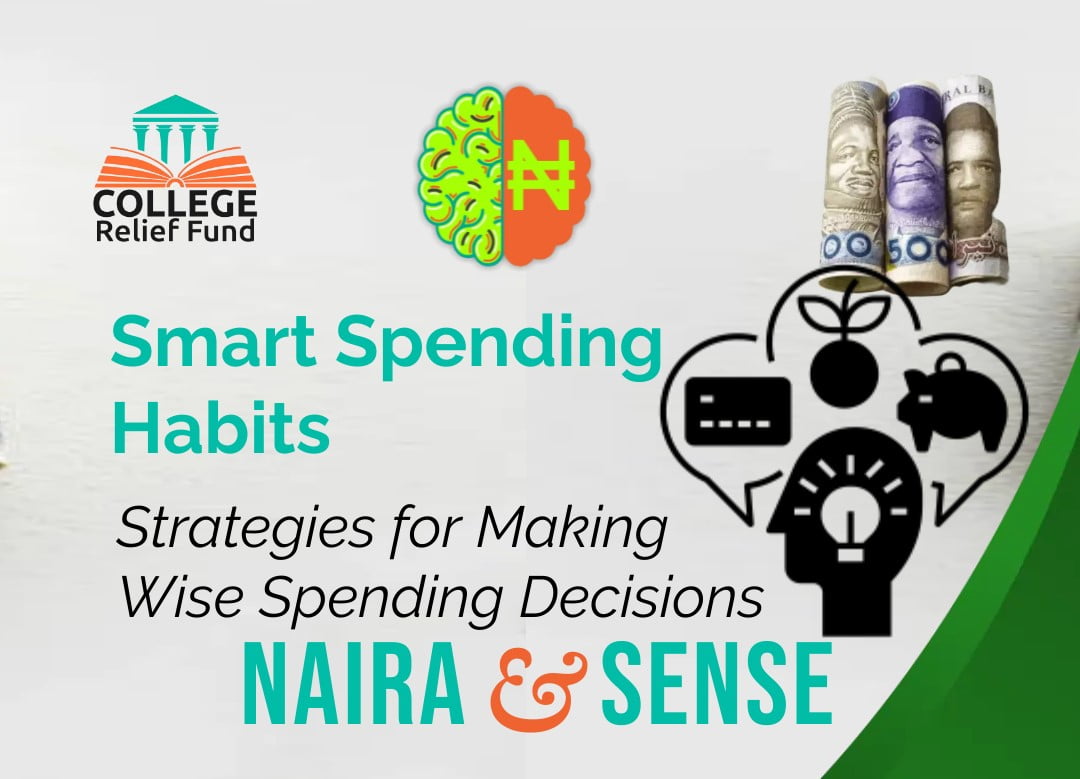Smart Spending Habits

In this lesson of the Naira & Sense Series, we’ll explore strategies for making wise spending decisions as a student. Managing finances wisely is crucial for a successful college journey, and it begins with understanding how to prioritize needs over wants and avoiding impulse purchases.
Learning Outcome:
After completing this lesson, you should be able to:
- Differentiate between needs and wants to prioritize spending effectively.
- Create and stick to a budget to manage finances responsibly.
- Avoid impulse purchases and practice delayed gratification for long-term financial success.
- Seek value and discounts to make the most of your money as a student.
- Consider practical strategies such as getting a roommate and investing in a bicycle to save money on living and transportation expenses.
1. Differentiating Needs from Wants:
One of the fundamental principles of smart spending is being able to distinguish between necessities and luxuries. For example, while textbooks and groceries are essential for academic success and daily living, the latest smartphone or designer clothing may be considered wants. By prioritizing spending on needs over wants, you can allocate your resources more efficiently and avoid unnecessary expenses.
2. Creating a Budget:
Establishing a budget is essential for controlling your spending and ensuring financial stability. Start by identifying your sources of income, such as allowances, part-time jobs, or scholarships. Then, outline your fixed expenses, including tuition fees, rent, and utilities. Allocate a portion of your income to discretionary spending on non-essential items like entertainment and dining out.
See THIS Naira & Sense Lesson regarding budgeting. By adhering to your budget, you can avoid overspending and stay on track with your financial goals.
3. Avoiding Impulse Purchases:
Impulse buying can derail your budget and lead to financial strain. Before making a purchase, take a moment to consider whether it aligns with your needs and financial priorities. For example, instead of buying the latest gadget on impulse, ask yourself if it’s a necessity or a frivolous indulgence. Consider implementing a “cooling-off” period, where you wait 24 hours before making non-essential purchases. This allows you to evaluate whether the item is worth the expense and avoid impulse buying.
4. Seeking Value and Discounts:
Stretch your naira further by seeking value and discounts whenever possible. Take advantage of student discounts offered by retailers, restaurants, and entertainment venues. For instance, present your student ID to receive discounts on movie tickets or meals. Additionally, compare prices and shop around before making a purchase to ensure you’re getting the best deal. Consider buying generic brands or shopping at thrift stores to save money on everyday items.
5. Practicing Delayed Gratification:
Delayed gratification involves postponing immediate rewards for long-term benefits. Instead of giving in to instant impulses, save up for larger expenses or invest in experiences that bring lasting value. For example, rather than splurging on a weekend getaway, save your money for a meaningful travel experience during a school break. Cultivating patience and discipline in your spending habits can lead to greater financial stability and security in the long run.
6. Getting a Roommate:
Consider sharing accommodation with a roommate to split living expenses and reduce housing costs. By sharing rent, utilities, and other household expenses, you can significantly lower your monthly living expenses and free up more money for savings or other priorities.
7. Getting a Bicycle:
Investing in a bicycle can save you money on transportation costs while providing health benefits. Instead of relying on expensive public transportation or rideshare services, use a bicycle to commute to campus or run errands. Cycling is not only environmentally friendly but also promotes physical activity, improves cardiovascular health, and reduces stress. Plus, it’s a budget-friendly alternative to owning a car or paying high costs of transport.
Conclusion:
By adopting these smart spending habits and exploring additional cost-saving measures like getting a roommate and investing in a bicycle, you can take control of your finances and pave the way for a brighter financial future. Remember, every naira saved today is an investment in tomorrow’s success. Stay tuned for more practical tips and insights in the Naira & Sense Series.






Comments (42)
I’ve really learnt a lot. Thanks.
Wow, This is so Impactful,I really appreciate CRF for this wonderful lesson.
Good
An insight I will never forget,I follow the steps for better Saving and budgeting
Thanks
Thank you for this great impact on the strategies for making wise spending decisions as a student.
Very educative and good
Wow .This has educated me a lot . Thanks ..
So educative
Thank you so much , but when it gets to saving on transportation cost, is there an alternative to bicycle?
Thanks very much for guidance towards smart spending habits tips. I learnt a lot.
I can only say the organisers of this platform will be bless by God Grace.
I now understood how to smartly spend and to plan dueling…
Thanks so much for this great lesson
Wow! What an insight…. Thank you for initiating this
Hmmmm….. This is an eye opener. “Naira saved today is an investment into tomorrow’s success”
Learnt a lot
Very Educative
I Love this series! Keep learning new things
Thank you CRF
This helps alot, its worth going through and will impact on so many
This has been so educative and impacting so far…
Thank you so much
Interesting
Thank you for this great teaching. I learnt a lot.
Thank you so much for this.
This was really nice
Learnt a lot
This is so educative
very educative
Thank you so much🙏🙏
This is so inspiring and educative
Informative
It have really open my eyes to many realities I have to emulate. This is big.
An educative series. Thank you.
Thank you so much
Thanks so much
This is a wonderful lesson to learn. Thanks a lot.
Thank you
This is very imparting. Thank you, CRF, and more grace to continue doing this wonderful and fantastic job.
Thanks for the knowledge shared,a lot to Brain storm on, yeah!I relearn
I keep to almost 80% of this wonderful lesson. Unfortunately, I don’t have a bike but it’s all good.
This was really impactful. Thank you CRF.
Wow,so educative.Thanks
Yeah, this is cool. I’ll work on it👍